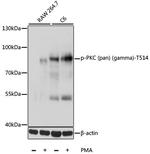Search Thermo Fisher Scientific
FIGURE: 1 / 1
Phospho-PKC Pan (Thr514) Antibody (PA5-97383) in WB

Product Details
PA5-97383
Species Reactivity
Host/Isotype
Class
Type
Immunogen
Conjugate
Form
Concentration
Purification
Storage buffer
Contains
Storage conditions
Shipping conditions
RRID
Product Specific Information
Positive Samples: RAW264.7, C6
Immunogen sequence: YQPYG
Target Information
Members of the protein kinase C (PKC) family play a key regulatory role in a variety of cellular functions including cell growth and differentiation, gene expression, hormone secretion and membrane function. PKCs were originally identified as serine/threonine protein kinases whose activity was dependent on calcium and phospholipids. Diacylglycerols (DAG) and tumor promoting phorbol esters bind to and activate PKC. PKCs can be subdivided into at least two major classes including conventional (c) PKC isoforms ( alpha, betaI, betaII and gamma) and novel (n) PKC isoforms ( delta, epsilon, zeta, eta and theta). Patterns of expression for each PKC isoform differ among tissues and PKC family members exhibit clear differences in their cofactor dependencies. For instance, the kinase activities of nPKC delta and epsilon are independent of Ca2+.
For Research Use Only. Not for use in diagnostic procedures. Not for resale without express authorization.
References (0)
Bioinformatics
Protein Aliases: 14 - 3 - 3 - zeta isoform; aging-associated gene 6; aPKC-lambda/iota; atypical protein kinase C; Atypical protein kinase C-lambda/iota; nPKC-delta; nPKC-epsilon; nPKC-eta; nPKC-iota; nPKC-theta; nPKC-zeta; PKC theta; PKC zeta; PKC-A; PKC-alpha; PKC-B; PKC-beta; PKC-gamma; PKC-L; PRKC-lambda/iota; Protein kinase C alpha type; protein kinase C beta I; protein kinase C beta II; Protein kinase C beta type; protein kinase C beta-II; Protein kinase C delta type; protein kinase C delta variant IX; protein kinase C delta VIII; Protein kinase C epsilon type; Protein kinase C eta type; Protein kinase C gamma type; Protein kinase C iota type; Protein kinase C theta type; protein kinase C type I (gamma type); protein kinase C zeta subspecies; Protein kinase C zeta type; protein kinase C, alpha; protein kinase C, beta 1; protein kinase C, beta 1 polypeptide; protein kinase C, delta; protein kinase C, delta IV; protein kinase C, delta V; protein kinase C, epsilon; protein kinase C, eta; protein kinase C, gamma; protein kinase C, iota; protein kinase C, lambda; protein kinase C, theta; protein kinase C, zeta; protein kinase c-alpha; protein kinase C-eta; protein kinase C[d]; Tyrosine-protein kinase PRKCD
Gene Aliases: 14-3-3-zetaisoform; 2310021H13Rik; 5830406C15Rik; A130035A12Rik; A130082F03Rik; AAG6; AI098070; AI385711; AI427505; AI875142; ALPS3; aPKClambda; aPKCzeta; AW494342; C80388; CVID9; D14Ertd420e; DXS1179E; MAY1; mKIAA4165; nPKC-delta; nPKC-epsilon; nPKC-eta; nPKC-iota; nPKC-theta; nPKC-zeta; PKC; PKC-0; PKC-alpha; PKC-Beta; PKC-gamma; PKC-L; PKC-theta; PKC-ZETA; PKC2; PKC[d]; PKC[e]; PKCA; PKCB; PKCC; PKCD; PKCdelta; PKCE; Pkcea; PKCepsilon; PKCG; PKCgamma; Pkch; PKCI; PKCL; PKClambda; Pkcq; PKCtheta; Pkcz; PRKACA; Prkc; PRKCA; PRKCB; PRKCB1; PRKCB2; Prkcc; PRKCD; PRKCE; PRKCG; PRKCH; PRKCI; PRKCL; PRKCQ; PRKCT; PRKCZ; r14-3-3; R74924; R75156; RATPKCI; SCA14; zetaPKC
UniProt ID: (Human) P17252, (Human) P05771, (Human) Q05655, (Human) Q02156, (Human) P05129, (Human) P24723, (Human) P41743, (Human) Q04759, (Human) Q05513, (Mouse) P20444, (Mouse) P68404, (Rat) P68403, (Mouse) P28867, (Rat) P09215, (Mouse) P16054, (Rat) P09216, (Mouse) P63318, (Rat) P63319, (Mouse) P23298, (Rat) Q64617, (Mouse) Q62074, (Rat) F1M7Y5, (Mouse) Q02111, (Rat) P09217, (Mouse) Q02956
Entrez Gene ID: (Human) 5578, (Human) 5579, (Human) 5580, (Human) 5581, (Human) 5582, (Human) 5583, (Human) 5584, (Human) 5588, (Human) 5590, (Rat) 24680, (Mouse) 18750, (Mouse) 18751, (Rat) 25023, (Mouse) 18753, (Rat) 170538, (Mouse) 18754, (Rat) 29340, (Mouse) 18752, (Rat) 24681, (Mouse) 18755, (Rat) 81749, (Mouse) 18759, (Rat) 84006, (Rat) 85420, (Mouse) 18761, (Rat) 25522, (Mouse) 18762

Performance Guarantee
If an Invitrogen™ antibody doesn't perform as described on our website or datasheet,we'll replace the product at no cost to you, or provide you with a credit for a future purchase.*
Learn more
We're here to help
Get expert recommendations for common problems or connect directly with an on staff expert for technical assistance related to applications, equipment and general product use.
Contact tech support
